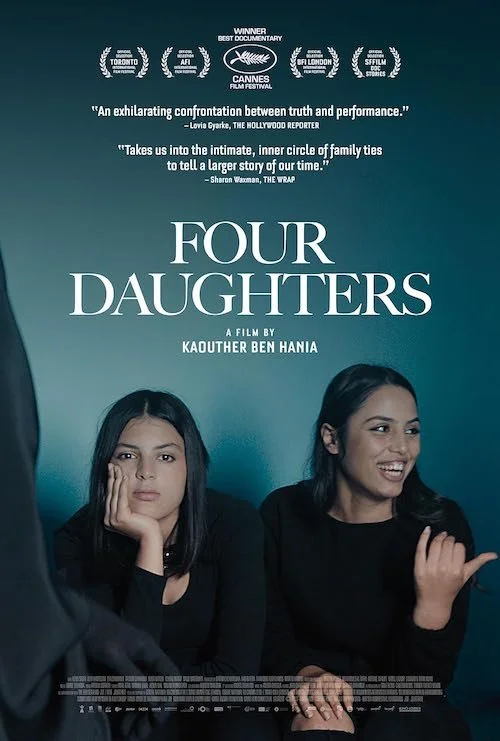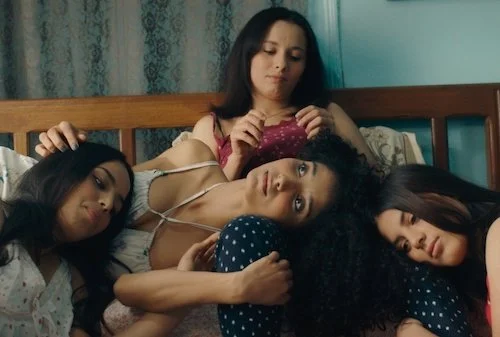Four Daughters
Written by Andreas Babiolakis
If art is full of one’s truth, what separates documentaries from narrative filmmaking? It’s a quest that Iranian auteur Abbas Kiarostami challenged again and again in his meta masterworks, and his magnum opus, Close-Up, features both real footage and acted scenes; he cast the real people involved in a trial to reenact how the events of said court case actually transpired, forcing them to relive these scenarios and question their own motives and responses (as if life itself was a rehearsal). I’ve been a fanatic of documentaries that have followed suit ever since, including Joshua Oppenheimer’s exemplary The Act of Killing which tasks monsters involved in the Indonesian mass killings of the sixties to direct their own films of differing genres to retell their stories. Yet another example has just been released, and this time it is from another director who is willing to take noteworthy risks: Kaouther Ben Hania (who was previously nominated for an Academy Award for The Man Who Sold His Skin).
Four Daughters uses the power of performance and art to try and reconstruct a shattered family via cinematic kintsugi: we can tell the family is still not whole, but we admire the attempt to fill in the gap nonetheless. I’ll explain further. Mother Olfa Hamrouni’s two eldest daughters, Ghofrane and Rhama Hamrouni, were taken by Islamic extremists. Director Ben Hania tries to console Olfa and the remaining daughters Eya and Tassir via the creation of this documentary. Furthermore, Ben Hania has tasked professional actors Nour Karoui and Ichraq Matar to fill in as Ghofrane and Rhama. They study the family and the unfortunate circumstances surrounding the daughters’ disappearance, and they begin to attempt to fill in this void (at least for a little while). Four Daughters turns the crisis and trauma into metafictional, documentary gold: a discovery of self within dread. This experiment proves to be too much for Olfa, so she eventually gets “recast” and replaced by another actor: Tunisian-Egyptian star Hend Sabri. Four Daughters keeps on trucking, aiming to get to the bottom of what may have happened, what comes next, and all things Hamrouni.
Four Daughters blurs narrative and documentary filmmaking so effortlessly that you’ll be forgetting which parts remain under which term.
The actors help bring out some internalized truths that the real people may feel too nervous or unsure to showcase. Additionally, the actors benefit from the real people alongside them as they are brought to emotional lengths that they likely have never experienced on any other set. There’s a clear marriage between voice and the camera’s gaze that both fiction and non-fiction works possess, and Four Daughters bathes itself in the ways that cinematic technology brings out the perspective of others. At times, I was somewhat forgetting who was living this story and who was brought on board to complete the cast of these lives; I don’t think I was ever fooled by the illusion of who is who, but I did temporarily feel like I was watching a full-on fictional feature at times when I was also staring at absolute truth and forgetting that I was.
This feels indicative of a Nathan Fielder experiment, perhaps without nearly as much cynicism or comedy (perhaps more in line with The Rehearsal or the Nathan For You episode “Finding Frances”, and the questioning of what constitutes as actuality in film and/or television). Four Daughters is a resounding success that had me paying more attention than if we got a traditional documentary (perhaps this was Ben Hania’s goal: to bring the utmost awareness to this family and have everyone fully listen). It is the best documentary of 2023 (and it’s got some tough competition between Still, Beyond Utopia, and 20 Days in Mariupol) because of how much it is willing to acknowledge that it is a documentary: a medium not without its faults (there are far too many opportunities for biases, misinformation, and other forms of clouded judgement). In a world where we all experience crises and are forced to act like everything is fine, we get something like Four Daughters where the art of acting is instead used to tell a fuller story and complete a series of thoughts and revelations. You don’t want to miss this one from a promising filmmaker who continues to get better and better with her craft.
Andreas Babiolakis has a Masters degree in Film and Photography Preservation and Collections Management from Toronto Metropolitan University, as well as a Bachelors degree in Cinema Studies from York University. His favourite times of year are the Criterion Collection flash sales and the annual Toronto International Film Festival.







